SUMMARY
This is AI generated summarization, which may have errors. For context, always refer to the full article.
![[Only IN Hollywood] Scene-stealing cat almost runs away with ‘Ripley’](https://www.rappler.com/tachyon/2024/04/RipleyHisNameIsKingAndHeReignsInRipley.GiveHimTheBestCatActorAwardAlreadyCreditNetflix-1.jpg)
LOS ANGELES, USA – In the finely acted Ripley, a cat, yes, a cat, steals the scene whenever he appears.
That’s quite a feat because writer-director Steven Zaillian’s terrific eight-episode adaptation of Patricia Highsmith’s popular Tom Ripley novel series is a feast of compelling performances by Andrew Scott, Dakota Fanning, Johnny Flynn, Maurizio Lombardi (remember his name), and a big cast of Italian actors.
Add Tom Ripley to the memorable characters of Andrew who is nurturing quite a list of roles, including his Golden Globe-nominated performance opposite Paul Mescal in Andrew Haigh’s All of Us Strangers. But for many fans, he will always be the “Hot Priest” in the Fleabag series,
But a feline named King is, well, king in his scenes as a silent but very eloquent (watch his knowing eyes) witness in Netflix’s crime-drama-thriller.
In the latest adaptation of Patricia’s Italy-set 1955 novel, the gatto, from his vantage point in the lobby of an apartment, watches resident Tom in his “activities,” including dragging the bloody body of a victim down the stairs.
Tom, a New York grifter, is in Italy, hired by a wealthy businessman (played by filmmaker Kenneth Lonergan) to lure his vagabond son, Dickie Greenleaf (Johnny Flynn), to return to the States. But Tom’s introduction to Dickie’s life on the Amalfi Coast accelerates his descent into deceit, fraud, and murders.
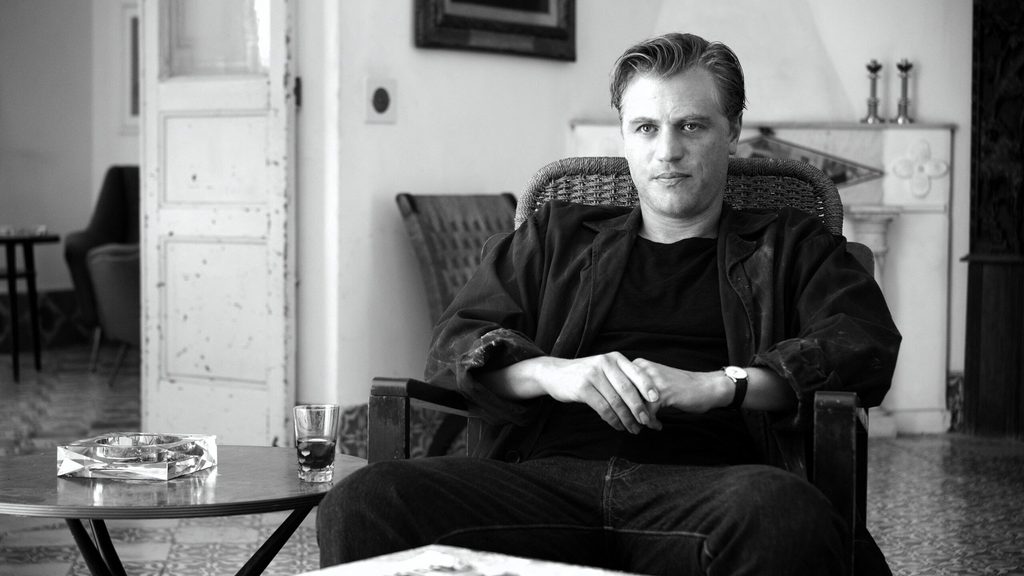
Dakota portrays Marge Sherwood, Dickie’s American girlfriend who is suspicious right away of Tom. Maurizio, as a detective (Pietro Ravini) with eyes as knowing as King, leads the excellent Italian cast. The supporting performers also include John Malkovich and Eliot Sumner.
In a recent video press conference for the miniseries premiering on April 4, I asked Steven Zaillian, Oscar and Golden Globe best screenplay winner for Steven Spielberg’s Schindler’s List, about his feline find, who could be this year’s Messi (the acclaimed dog in Justine Triet’s Anatomy of a Fall).
“The cat’s name in the show is Lucio,” answered Steven, whose directing credits include Searching for Bobby Fischer and All the King’s Men. “His real name is King. He is Italian.”
“He was not the first one to get cast,” revealed the filmmaker, whose other writing achievements include Gangs of New York, The Irishman, and Moneyball.
“He was actually like maybe the third one to get cast. And he’s a Maine Coon cat. He’s just amazing.”
“He’s a main character,” added Maurizio whom we interviewed with Dakota and Steven. We talked to Andrew and Johnny in a separate video call.
Steven agreed, “Yeah. And you think about how it’s really difficult to get a cat to do what you want. But King is a natural actor.” With a laugh, Dakota concurred, “Yeah!”
Asked if the first two cats who were cast were not up to the role’s acting challenges, Steven replied, “Yeah, they would wander around. They’d get up and walk off or just not do what we wanted them to do.”
Steven said that King would “just sit and scrutinize what’s going on. And basically, that’s what he did.”
“We would have people doing the things that Tom was doing and he would just watch. He was fabulous.”
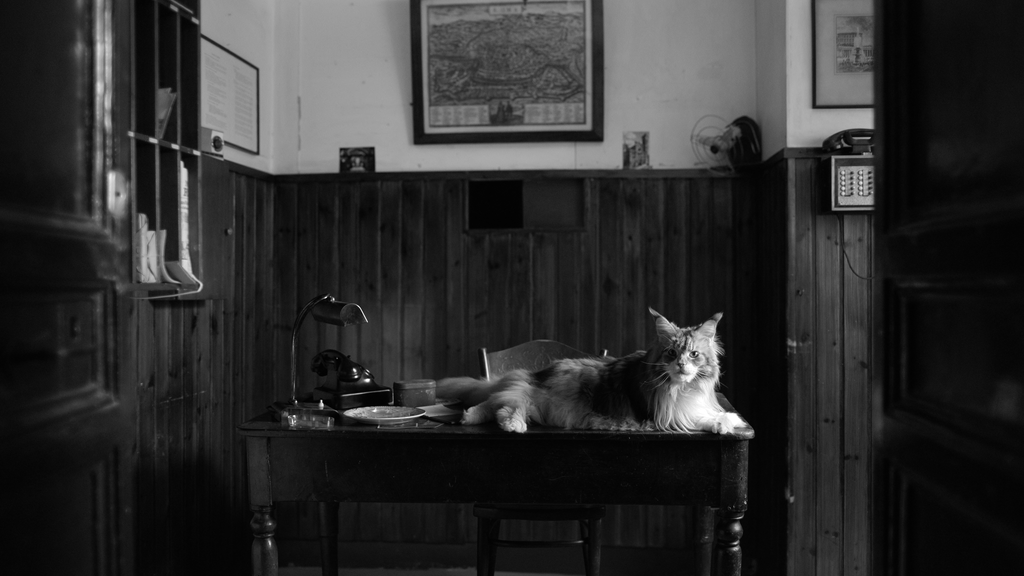
Just sitting beside the stairs and the elevator, King would say it all with just his eyes as he observed the suspicious comings and goings of Tom. If King could talk, Maurizio’s detective would have easily solved the murder mysteries.
Simply looking up or staring at Tom, King is up to par with his excellent cast mates. The late Patricia, who was said to be an ailurophile, would have approved of King.
King’s purrfect reactions were captured by cinematographer Robert Elswit in stunning black and white. Robert’s noirish images evoke the dark, brooding mood of the story set in 1960s Italy.
Johhny, citing such masterpieces as Federico Fellini’s La Dolce Vita and 8½, said, “Watching films from the period, thinking about Fellini and the films that were being made in the period that the book is set, was a wonderful atmospheric reference. The colors and the clothes were very muted.”
“Steve’s idea, which is true to the book, as opposed to other versions of the story, was that none of the warmth of Italy that we know about is really represented. It’s kind of out of season.”
“They (Dickie and Marge) are the only people on the beach when Tom finds them and I love the framing of that.”
“We were really there in these incredibly beautiful places that people go to on holiday. But as the seasons changed, the only people left were the local fishermen.”
“So, yeah, in terms of what the atmosphere that we felt, there’s darkness, especially on the Amalfi Coast.”
“Because it’s incredibly beautiful. Crumbling villages right on the sea. Then there are mountains so there are huge shadows, and there are these strange caverns and stairways.”
“And all of that is what makes the atmosphere of the story have that kind of Gothic, noir quality that’s very beautiful but also quite eerie.”
“So, tonally, with the black and white, watching it, for me, it all works, with the music, as well. It’s really powerful.”
Andrew commented, “Exactly, what Johnny says is true but I feel like the black and white doesn’t work alone. I feel like it’s in a marriage with the way we’re taught to watch the show.”
“The black and white, the visuals, really matched the tone and the pacing of the show because we’re taught how to watch it. We’re invited to be mesmerized by the way the story unfolds in the same way that we are in a novel.”
“So, to me, it’s very of the period. Steve said something interesting, which is that, of course, if Patricia Highsmith was writing at the time and she was thinking about it as a film, she would be thinking about it in black and white. In that sense, that’s a very interesting way to look at it.”
“I love the idea that novels can have different interpretations, like this one has. And Steve, he read the novel and it had a black-and-white cover on it.”
“I love the fact that that can ignite something completely different in different filmmakers. For Steve, he saw it very singularly and he is one of our most extraordinary writers.”
“And he wrote these extraordinary scripts that are both incredibly classic and also wonderfully modern and inventive. I love the fact that another artist can ignite the imagination of another artist. I hope our series can ignite the imagination of artists who might watch this, too.”
Steven added about the beautiful black and white photography which contrasts with Anthony Minghella’s 1991 The Talented Mr. Ripley, starring Jude Law, Matt Damon, and Gwyneth Paltrow: “I felt that it would be distinctive in black and white because it wouldn’t be like some sunny postcard of a story, which I don’t think the book was.”

“It was rather dark and foreboding. I wanted to shoot in Italy in the wintertime to get this kind of shadowy film noir feel for Italy. And so black and white lent itself to that.”
On why he wanted his adaptation to be a miniseries, Steven explained, “I’ve been a fan of the book for a long time. Of course, I’d seen the other adaptations that have been done of the book.” Rene Clement made a 1960 version, Purple Noon (Plein Soleil), with Alain Delon as Tom.
“But I felt that, to do it the way I wanted to do it, I needed more time. And the eight-episode format suited this book, I felt.”
“It allowed me to get into the details of the story, the details of the characters, and the changing relationships between the characters in a way that you can’t really do in two hours. So that was the allure for me.”
“Obviously, that’s a film that people love,” Andrew said of the 1999 adaptation. “I’m one of the people who loves that film and the performances.”
“So it was a concern when you hear about a project like this, is that going to be a remake in some way? Or what’s the point in aping someone else’s already successful work?”
“And right from the beginning, I knew that was completely the opposite intention of Steve.”
“There have been a few iterations of the story over the years but Steve had a very particular vision for the story right from when he read it many years ago. And the opportunity to write it and to tell the story in long-form television was a really interesting dynamic for him.”
Andrew also brought up the black and white element in Steven’s version: “He had a very strong vision that he wanted it to be in black and white.”
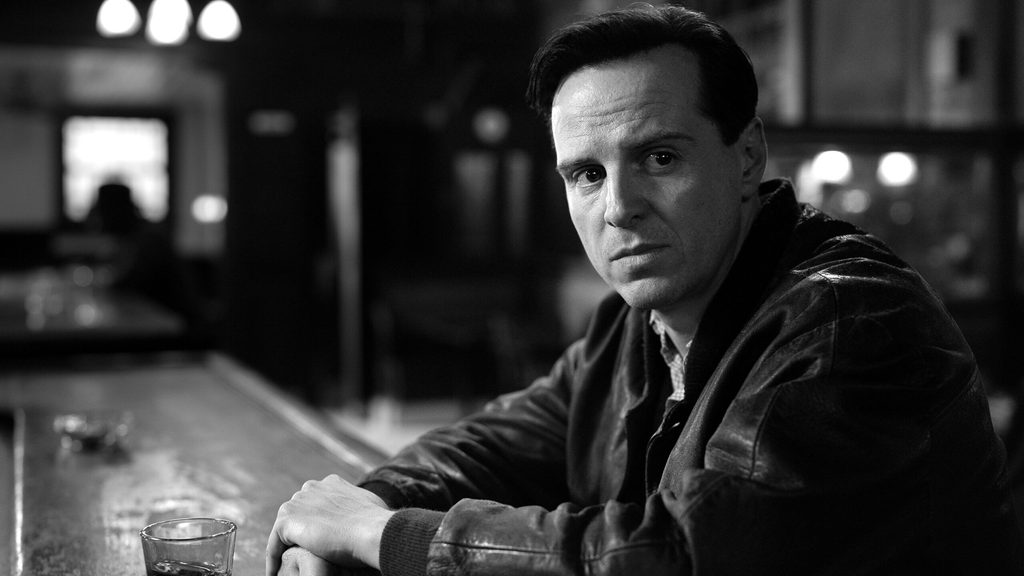
“And the idea that the black and white can be married in some way to the way he wanted to teach the audience how to watch this story in a very particular way was very similar to the way we might read a novel.”
“We don’t read a novel in two hours or two and a half hours. We read it over a certain amount of time. So within the story, we can focus sometimes very exclusively on a very particular aspect of the story, a little corner piece of the story.”
“And then sometimes it’s about the plot and sometimes about the characters. I think that’s enormously engaging for the audience.”
For Andrew, reading Steven’s complete scripts immediately convinced him about this latest adaptation, which was coproduced by Showtime and Endemol Shine North America with Entertainment 360 and Filmrights. He also served as one of the producers.
“The scripts were extraordinary,” he enthused. “It’s unusual for us, as actors, to get all the scripts.”
“Sometimes, in a limited series, you might get one or two, and they go, ‘This is what our intention is.’ But I remember I read it on a long-haul flight and I was just completely captivated, like reading a novel.”
“Steve wrote in a very novelistic sort of fashion. You find yourself engaged enormously with the plot.”
“Then, in another episode, you would be really thinking about the characters, and in, another episode, it would be completely singular, like, almost a stand-alone action sequence. I thought, oh, my God, you get to do action, sort of, in this as well.”
“And so it seemed like it was completely, compassionately, and respectfully written in relation to what the original intention of Patricia Highsmith might have been without being overly irreverent. And it was very tele-visual.”
“He had such a strong idea. And so I love it. I just jumped at the chance to be able to play the character because it’s an extraordinary opportunity for an actor.”
As the fraudster Tom, an expert at forgery and assuming different identities, Andrew is at the top of his game. Trying to be always a step ahead, Tom, in Andrew’s nuanced interpretation, is constantly on alert and thinks fast although not always successfully.
As a man on the run, Andrew’s Tom allows a brief smile when he sees Venice for the first time. It’s a brilliant moment when Andrew’s face lights up. The smile is gone as quickly as it appeared.
Andrew approached Tom as an all-too-human being who can be clumsy in his heinous acts.
The All of Us Strangers star said, “We get to spend some time with the characters and we get to watch this man think and make mistakes. With very famous literary characters, you sometimes have it with Shakespearean characters or very famous characters that people have a real possession of.”
“And rightly so, that you can be very overly concerned with the famousness of the character or what the buzzword for the character might be, psychopath, sociopath, or serial killer and all those things.”
“And none of those things are of any interest to me. I don’t think Tom is a natural-born killer.”
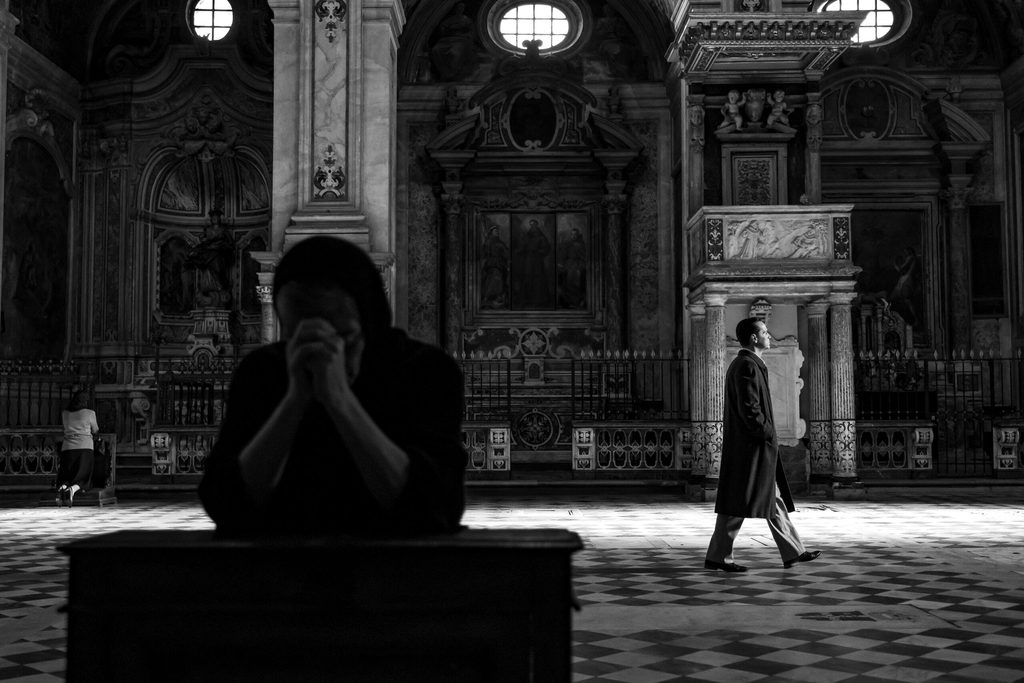
“He’s very fallible and makes mistakes. We see those mistakes happen in real time and we also see his real talent taking place as well.”
“So all those things were available to me and so as soon as I spoke with Steve, any concerns on that level were put aside. For people watching it, I think those concerns immediately go when they see this unique singular take on the story.”
Steven shared his stance on writing Tom: “I never really think about making a character empathetic or sympathetic. I try to just write who the character is.”
“But I’ve never felt that he was a psychopath. I know people sort of describe him as that sometimes but he is certainly not a professional killer.”
“He’s not good at it. He does it in kind of a sloppy way that we might do it in.” In this adaptation, Tom certainly almost makes it a comedy of errors, albeit a realistic one, when he returns to a crime scene after he remembers something that he should have done.
“And that’s another reason why we relate to him – he’s not that. He’s no better at that sort of thing than we would be.”
“So I just try to show what he does and sort of what he’s thinking moment by moment.”
“And that’s another reason why having the eight hours helps because you can get into a scene that otherwise might just feel like plot and here it feels like character.”
On whether he had a grudging admiration of Tom’s con talents, Steven said, “Absolutely. What’s not to admire? Thinking he’s got a lot of the same traits we all have, in terms of having his desires, pride, wants, and needs.”
“He just wants and needs those things more than we do and that drives him to do some terrible things. But yes, he’s quite talented.”
“As Marge says at one point, he’s a professional liar. That’s what he does. And it basically fuels everything that he does.”
“It’s like he’s incapable of telling the truth. And he’s good at it.”
As to whether Tom is a sociopath, Andrew admitted, “I was very reluctant to diagnose the character with anything too specific. I think the reason that the character is so enduring and so iconic is because we have so many questions about him.”
“And so to answer too many of them in a too specific way reduces the character. The reason that we find people fascinating, scary, terrifying, or uncomfortable is because we don’t have too much information about them.”
“So I always feel like the information that Tom gives off about himself is not necessarily reliable. What you have to do then is a little bit like holding water.”
“You need to get a sense of that without diagnosing his nationality or even his age or his sexuality, that you have a thing where you can’t quite catch that.”
“And it’s very interesting – a lot of people ask, have you ever encountered a Tom Ripley? I think the reason the character is so enduring is that it’s not about encountering a Tom Ripley but actually saying what part of Tom Ripley is within us.”
“And that’s why the achievement of Patricia Highsmith’s novel in creating this character is that we actually root for this person who’s doing these bad things.”
“Because what she’s talking about is a man who’s ignored by society, who’s actually incredibly gifted. He’s a con artist but he’s nevertheless an artist.”
“He has to, in order to survive, make his living fraudulently and he’s ignored. He doesn’t have access to any of the beautiful things that some of the other characters in the story do, namely arts, music, and beauty.”
“And when you ignore those people and they’re suddenly exposed to it, I think they become aware of a sort of rage that they have within them.”
“For some, it’s a very light message within the story but it’s certainly a message which is, everybody is deserving of beauty and arts in the world. It’s not for a certain section of the community.”
“It’s not just for the rich. And talented people are all over the world in developed countries and developing countries. And we have to understand that it’s about class, money, morality, and fairness.”
Andrew was definite on one aspect of Tom: “I don’t see Tom as a villain. I know other people have every right to call him a villain but I think he’s so complex. It’s too easy for us to call him just a villain.”
“I certainly think he’s an anti-hero. The question I really believe is, what I think the great achievement of the stories, and this version of the script, is that we really are rooting for somebody that we shouldn’t necessarily root for.”
“We want him to get away with it, for the most part. We question him and that can only be because we see ourselves in Tom Ripley.”
“So the idea was to make the audience feel what it’s like to be Tom Ripley, not to be a victim of Tom Ripley. Because we all have darkness within us.”
“And we’re a mystery to ourselves, in many ways. We’re not all necessarily murderous but I think there is darkness.”
“There are questions we have about ourselves. We remain a mystery to ourselves and we don’t find the answers.”
“It’s very interesting talking about the character because of all the characters that I’ve spoken about, this is the one that people want answers for. They want, what’s his sexuality? Where is he from? Is that true, the thing?”
“And I love that, because, in some ways, those questions are quite naïve. Because that’s the whole point – that we’re not going to know.”
“We’re not going to get the answer to the why but it does make us ask the questions. I think that’s a sign of really good art.”
Dakota, herself subtly compelling by oftentimes just using her eyes, praised her costar: “I couldn’t have asked for a better person to get to work with, so intimately than Andrew. We have a similar approach to our work – also need to have some joy.”
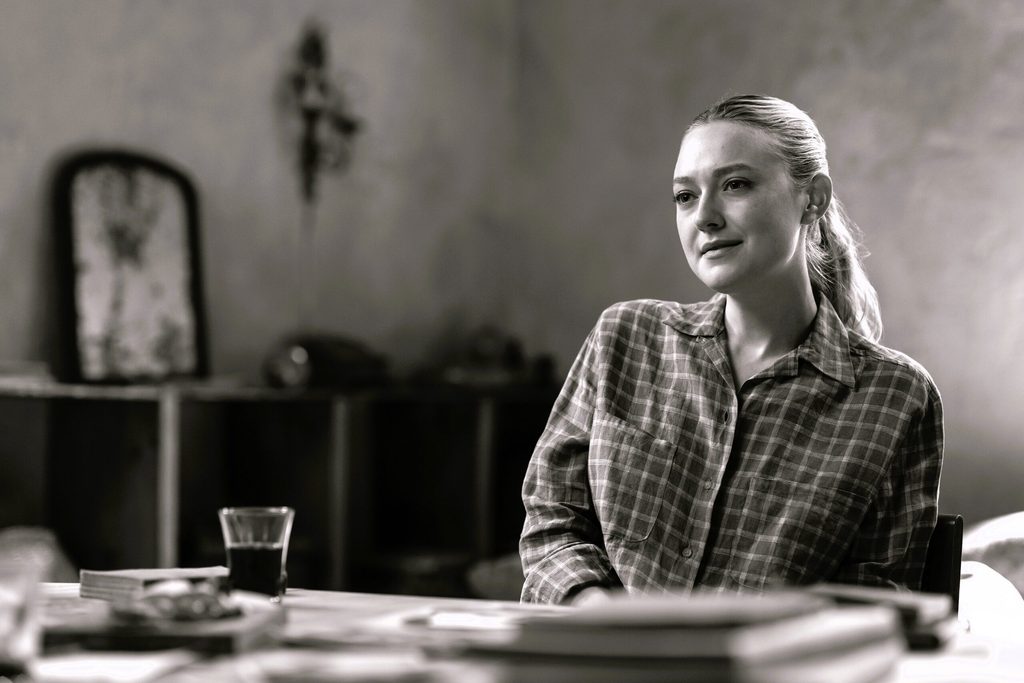
“And so we were able to really lean on one another and in between. But working with him, it’s a rare occasion that you kind of can be taken out of something by seeing how brilliant the other actor is during a take. And that definitely happened with me and Andrew.”
“I just love him as a person and as an actor and getting to do those scenes as Marge and Tom were so much fun. Challenging but fun.”
Steven talked about Tom from Marge’s skeptical perspective of him: “That’s one of the great things about the character and how Patricia Highsmith conceived Tom, as she somehow makes us not just understand what he’s doing but we are kind of complicit in it, in a way.”
“But Marge is one of my very favorite characters because she’s on to him right away. The first moment she meets him, she knows something’s not right and then kind of goes back and forth with him.”
“It’s sort of like she doesn’t trust him. Then he plays to her vanity and she thinks he might be okay. And then she becomes suspicious again and it goes back and forth.”
“And she is really the only character who knows him this long. Meaning she meets him in episode one and she’s still dealing with him in episode eight. She’s the only character that does that.”
“So they have a lot to do with each other and their relationship keeps changing. It’s really fun to watch.”
It’s also a delight to watch Maurizio as the determined inspector whose piercing gaze, deliberate manner, alternating impatience, and cool demeanor make his turn one of the best supporting performances this year, this early.
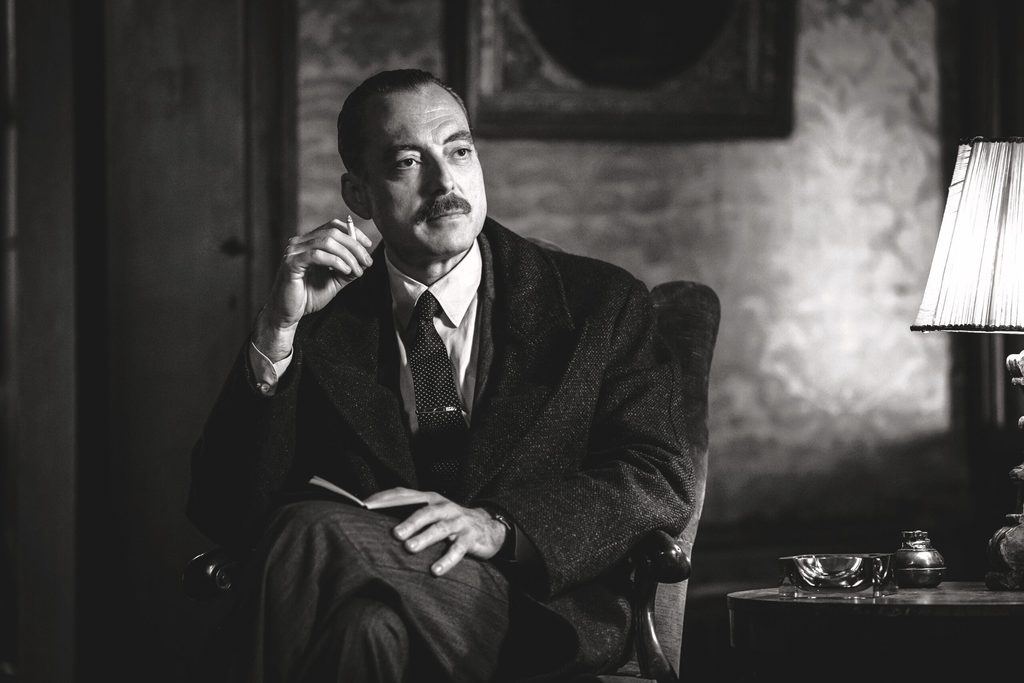
Steven said of his very watchable Italian actor (aside from King, of course): “We get time to understand who he is in a way that we’ve never seen in any film. It’s like his character becomes very important in this story in the time that we have to tell it and because he’s so good.”
Italy, with its dramatic landscapes and many statues, religious images, sculptures, gargoyles, and paintings that appear to be quiet observers of the goings-on, especially Tom’s murders, is the other terrific “actor” in this limited series.
“It was so interesting to see parts of Italy and how they’re all so different,” Dakota remarked.
“And they’re kind of all different in the series, too. Like, each place has its own mood and vibe and its own role in the series.”
“Italy is such an important piece of this story. It was so special to be in the places that you’re supposed to be in and to be actually filming there.”
“I hadn’t spent a ton of time there (previously) and I really got to enjoy it on my off days. And the people were amazing. It was a really wonderful adventure.”
Steven pointed out, “We did film all over Italy – the Amalfi Coast, Naples, Palermo, Rome, Venice, and each one does have its own distinctive feel. And we were really trying to capture that. You don’t mistake one for the other.”
“We had something like 250 people on our crew. I would say every one of them devoted themselves to this.”
“They worked so hard and had so much passion for it. That was wonderful for me.”
Steven also relished “being able to cast something like 150 speaking parts and 90% of them are Italian actors. So for me to get to choose that many really fine actors, I just loved it.”
Indeed – Italian actors, even in brief roles, including as hotel clerks since Tom is always changing hotels in his life as a grifter – add to the richness of this show. Margherita Buy (The Station) plays Tom’s landlady and the owner of King, her apartment’s very curious and furry “concierge.”
Andrew, as a man who has to adapt quickly to his Italian setting, welcomed the additional challenge of playing Tom: “It was fascinating. I had to do a lot of acting in Italian.”
“I wanted to get it right because I think Tom would be good at it and he’s a quick study, as Dickie calls him.”
“We had lots of wonderful Italian actors. And quite a difficult thing for Italian actors to come in for a day, if you’re playing a hotel clerk or a member of the police department, act in a different language sometimes and for them too. And to kind of create an atmosphere.”
“And what’s difficult sometimes on film and TV sets is the person who comes in who has one line is there for maybe a morning. So you never get to bond or feel like they’re part of a whole big machine.”
“And so to try and make those people feel welcome and to hear what their concerns or questions might be is really important to me. And particularly given that there’s actually a very large supporting cast.”
“And we have a really colorful group. The show is beautifully cast. So grateful for them and particularly for this brilliant man and actor on my right (Johnny).”
Johnny, for his part, shared, “I just fell deeply in love with the country, the people, and the food. But in terms of the cast, we started this before people had been vaccinated for COVID.”
“There was a lot of quarantining. We were away from home and the dates would shift because of COVID restrictions.”
“Thinking of the guy who plays the Mafia guy. I remember that day really clearly. He was so good.”
“And to play a high-status character when you are somebody who comes in for one day and in a language that isn’t your first language is a tall order.”
About his character Dickie and what were Steven’s notes to him, Johnny replied, “Steve just kept saying he’s a nice guy. I just remember him saying that a lot.”
“I think the novel and our version are very much from Tom’s perspective. And that’s the beauty of her writing – you get onto a level with his thinking, which is a huge achievement. You slowly kind of get into his logic and why you start to feel for him and you empathize with him.”
“And there’s not a lot that is there to really explain what Dickie is about. But he’s somebody that Tom sees and a life that Tom sees.”
“And the way I tried to do it was really by finding the reasons to be intrigued by this person who comes into our lives.”
“There was such a natural connection with Andrew. I really just saw Dickie as a good guy who’s a little lost.”
“This person comes into their lives who he finds intriguing and there’s a connection and is also somebody who he can teach about the way he sees the world.”
“And it’s rewarding for him that this person loves the world, that he sees the ideals for beauty that he holds, that he’s so excited by that. And so it’s a sweetness in him, really, that I wanted to come out.”
Johnny added, “There’s not such moral ambiguity around him. He’s not having an affair and all that sort of stuff. So we’re allowed to feel empathically towards him. I tried not to impose too much on the character.”
“Steve’s scripts were very precise in terms of the story beats and in terms of who he is. You don’t need to show too much of his backstory. He’s just existing in these moments.”
“I thought of him as somebody who had run away from his cultural identity because he has a kind of shame around it. And his parents may be kind of nouveau riche. There’s this sort of brashness.”
“And so he comes to Old World Europe to hide himself in the idea of being an artist in this beautiful place and just feed off of that. That’s what I thought about.”
As for the nature of Tom and Dickie’s relationship, impacted by a moment when the latter walks in on the former pretending to be him, Johnny answered, “As Andrew was saying, there’s a lot of questions that aren’t necessarily answered.”
“I didn’t have a hard and fast answer. It’s not that that moment means to Dickie that Tom is not viable anymore.”
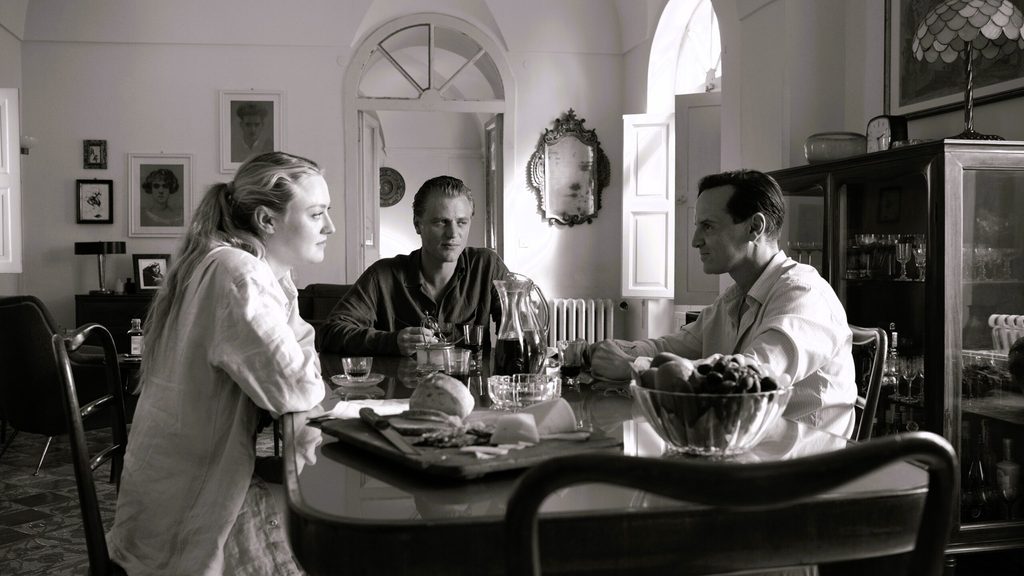
“He doesn’t know what to do with that information or I think a part of him is probably thrilled, actually.”
“I think it’s a kind of like, what do I do? What do I do with that information because the rules in my life that I’ve been living by don’t have the answer for that moment?”
“That’s why I love the scene that follows. That when we’re outside, in a folly in the garden because life is messy and this situation suddenly becomes a little bit messy between them. That’s a wonderful thing to show between two people.”
“It’s just much more interesting than the kind of like oh, we can’t be friends anymore or whatever. It’s so interesting that he forgives him. That’s what he did. Because he could have gone, actually, ‘Get out.’ But he actually doesn’t.”
“I think he’s sad because, the way I see it is, Dickie is aware of Marge’s suspicions. And once his father sends this letter and everything, there’s a kind of like he wants to make it okay.”
“I think he hopes that Tom is gonna kind of go away for a bit and make things good and then come back into his life. And I think he really loves Tom.”
“He just doesn’t know how to articulate it to himself more than anything. So I think their friendship is very real.”
Robert’s exquisite black and white cinematography perfectly captures the famed chiaroscuro elements of the late 16th and early 17th century painter Michelangelo Merisi da Caravaggio, whom Tom admires. Andrew’s Tom is shown in awe when he stands in front of Caravaggio’s intense and realistic art in Italy.
“That is very much a Steve Zaillian stroke of genius,” Andrew said. “Caravaggio is an artist that I also adore.”
“My mother was an art teacher and she taught me about Caravaggio and his use of light. It was so extraordinary that this was like now part of this story.”
“And we, of course, went to see these beautiful Caravaggios and what a privilege to do that.”
Andrew added about Caravaggio, who had a violent reputation and was meted a death sentence for murder, forcing him to flee: “I love the connection between Tom’s absolute fascination with this very dark, also criminal man but also a great genius and how the double image of Caravaggio’s, the sort of double self-portrait is there.”
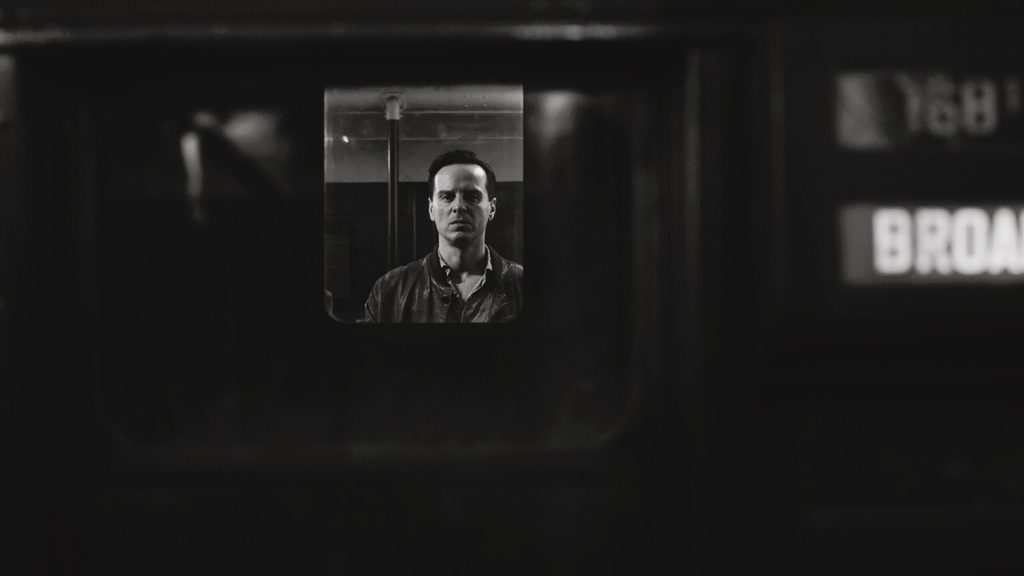
“I think it’s because those works of art are timeless in a sense and there’s something about the great genius of that that just continues to fascinate people.”
“And in some small way, like the way the character of Tom Ripley continues to fascinate people, audiences love to watch. They don’t necessarily always need to see goodness.”
“Or the new word that everybody is concerned with these days – accessibility. I don’t think accessibility is necessarily what audiences need. They don’t need to necessarily relate to all the characters.”
“Because actually sometimes what we relate to is inaccessibility. Some people don’t have access to their feelings in the way that we would like.”
“We can’t access that. And that’s hard. And that’s what they recognize in Tom.”
“So, to see that, our job as artists, and I think Caravaggio understood that, is to represent what’s there, not what we wish was there.”
“So, the representation of darkness, to me, is very important because it means that we can understand our lightness and our goodness in contrast to it. But that’s with artists, so at the center of this story and who gets access to the arts.”
“Because not everybody does. And that has to be, in my mind, rectified and protected in some way.”
In wrapping up the video calls, the cast was asked what they hope the viewers would take away from watching Ripley.
Maurizio said, “I think the audience will make a deeper trip inside the human being because this novel is amazing and the script by Steve is so accurate.”
Andrew shared, “We worked extraordinarily hard and no one more than Steve Zaillian. He was incredibly fastidious and meticulous about every single aspect of the show. I think that really shows.”
“My real excitement for the show is that it’s a very unique way of watching television now. I think the pacing is really mesmerizing, extraordinary, and varying.”
“It’s not often that we get to see a limited series like this in black and white with such extraordinary production design.”
Steve, for his part, said, “We spent a lot of time doing it and it was a labor of love. And I’ve been living with it for five years.”
“And I was saying to Dakota, I’m about to let go of it. And now, it will be in the world and it’s up to people to take what they want from it.” – Rappler.com
Add a comment
How does this make you feel?
There are no comments yet. Add your comment to start the conversation.